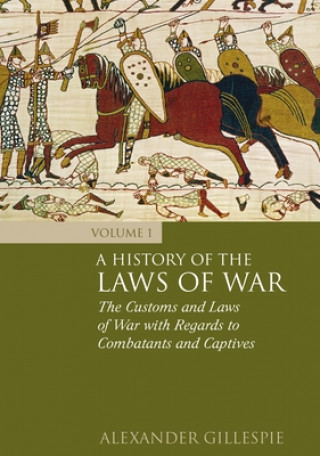
Dostava
Savjetnik za kupnju





Proizvod vam ne odgovara? Nema veze! Možete nam vratiti unutar 30 dana
 Poklon bon
u bilo kojoj vrijednosti
Poklon bon
u bilo kojoj vrijednosti
S poklon bonom ne možete pogriješiti. Za poklon bon primatelj može odabrati bilo što iz naše ponude.
History of the Laws of War: Volume 1
 Engleski
Engleski
 366 b
366 b
30 dana za povrat kupljenih proizvoda
Moglo bi vas zanimati i


This unique new work of reference traces the origins of the modern laws of warfare from the earliest times to the present day. Relying on written records from as far back as 2400 BCE, and using sources ranging from the Bible to Security Council Resolutions, the author pieces together the history of a subject which is almost as old as civilisation itself. The author shows that as long as humanity has been waging wars it has also been trying to find ways of legitimising different forms of combatants and regulating the treatment of captives. This first book on warfare deals with the broad question of whether the patterns of dealing with combatants and captives have changed over the last 5,000 years, and if so, how? In terms of context, the first part of the book is about combatants and those who can 'lawfully' take part in combat. In many regards, this part of the first volume is a series of 'less than ideal' pathways. This is because in an ideal world there would be no combatants because there would be no fighting. Yet as a species we do not live in such a place or even anywhere near it, either historically or in contemporary times. This being so, a second-best alternative has been to attempt to control the size of military forces and, therefore, the bloodshed. This is also not the case by which humanity has worked over the previous centuries. Rather, the clear assumption for thousands of years has been that authorities are allowed to build the size of their armed forces as large as they wish. The restraints that have been applied are in terms of the quality and methods by which combatants are taken. The considerations pertain to questions of biology such as age and sex, geographical considerations such as nationality, and the multiple nuances of informal or formal combatants. These questions have also overlapped with ones of compulsion and whether citizens within a country can be compelled to fight without their consent. Accordingly, for the previous 3,000 years, the question has not been whether there should be a limit on the number of soldiers, but rather who is or is not a lawful combatant. It has rarely been a question of numbers. It has been, and remains, one of type. The second part of this book is about people, typically combatants, captured in battle. It is about what happens to their status as prisoners, about the possibilities of torture, assistance if they are wounded and what happens to their remains should they be killed and their bodies fall into enemy hands. The theme that ties all of these considerations together is that all of the acts befall those who are, to one degree or another, captives of their enemies. As such, they are no longer masters of their own fate. As a work of reference this first volume, as part of a set of three, is unrivalled, and will be of immense benefit to scholars and practitioners researching and advising on the laws of warfare. It also tells a story which throws fascinating new light on the history of international law and on the history of warfare itself. 'The law impacts on modern military operations at all levels. The importance of understanding the influence of international law, and the constraints, which it places upon the conduct of armed conflict, is an essential area of study. Dr Alexander Gillespie's three volume work traces the development and scope of this law from the earliest times through the modern day. In doing so he identifies constant themes and common principles in the law, as well, unfortunately, as all too common breaches. Commanders and historians, as well as lawyers, will find this book of great value. It is written in a practical and useful style and brings to light many fascinating examples of the law at work in times of war from which contemporary lessons can be learned'. Brigadier Kevin Riordan, Director General of Defence Legal Services for the New Zealand Defence Forces. 'The span of scholarship on offer in these volumes is astonishing...an extraordinary gathering of historical and legal materials many of which record the most sombre and tragic events of human history - war in all its terrible forms.' Rt Hon Sir Geoffrey Palmer, Former Prime Minister of New Zealand 'At a time of real challenge, Alexander Gillespie is to be commended for his monumental and significant contribution to our understanding of the context, practice and principles that govern war and armed conflict. This vital book is an indispensable part of any library, and will be a necessary resource for governments, NGOs, international organisers, academics and lawyers involved in the issues.' Professor Philippe Sands QC, University College London "This is a comprehensive and comprehensible account of the laws of, against and about war. It is both authoritative and accessible - Alexander Gillespie's great achievement is to provide a map for a better future, in which the inevitable horrors of armed conflict are recognised and minimised, and those who instigate them unlawfully are punished by international courts. This is a must-read for all concerned to ensure that war laws do not end up in the graveyard of good words.' Geoffrey Robertson QC, founder and head of Doughty Street Chambers, author of Crimes Against Humanity (Penguin and The New Press)
Informacije o knjizi
 Engleski
Engleski




 Kako kupovati
Kako kupovati



























